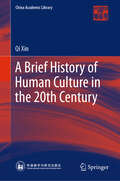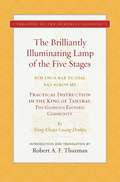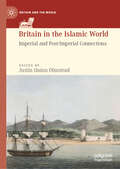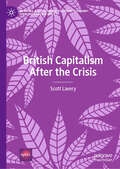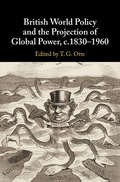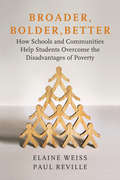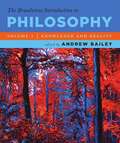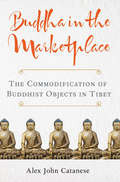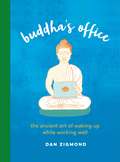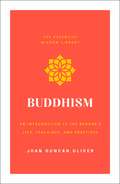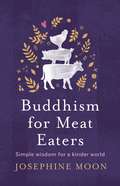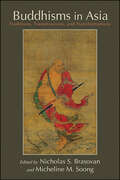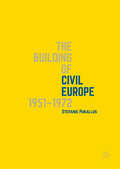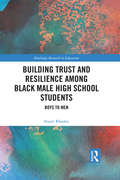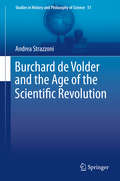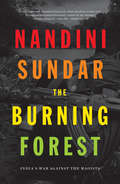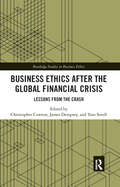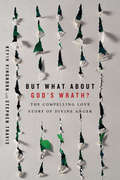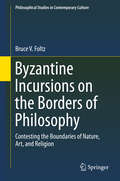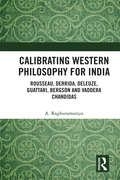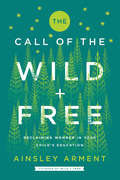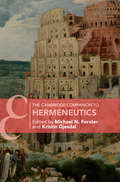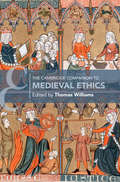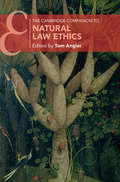- Table View
- List View
A Brief History of Human Culture in the 20th Century (China Academic Library)
by Qi XinThis book examines the cultural concepts that guided the development of the “age of mankind”— the changes that took place in historical, philosophical, scientific, religious, literary, and artistic thought in the 20th century. It discusses a broad range of major topics, including the spread of commercial capitalism; socialist revolutions; the two world wars; anti-colonialist national liberation movements; scientific progress; the clashes and fusion of Eastern and Western cultures; globalization; women’s rights movements; mass media and entertainment; the age of information and the digital society. The combination of cultural phenomena and theoretical descriptions ensures a unity of culture, history and logic. Lastly, the book explores the enormous changes in lifestyles and the virtualized future, revealing cultural characteristics and discussing 21st -century trends in the context of information technology, globalization and the digital era.
A Brief History of Schooling in the United States: From Pre-Colonial Times to the Present (The Cultural and Social Foundations of Education)
by Edward JanakThis book presents a sweeping overview of the historical and philosophical foundations of schooling in the United States. Beginning with education among the indigenous peoples of the Americas and going on to explore European models of schooling brought into the United States by European colonists, the author carefully traces the arc of educational reform through major episodes of the nation’s history. In doing so, Janak establishes links between schools, politics, and society to help readers understand the forces impacting educational policy from its earliest conception to the modern day. Chapters focus on the philosophical, political, and social concepts that shaped schooling of dominant and subcultures in the United States in each period. Far from being merely concerned with theoretical foundations, each chapter also presents a snapshot of the “nuts and bolts” of schooling during each period, examining issues such as pedagogical devices, physical plants, curricular decisions, and funding patterns.
The Brilliantly Illuminating Lamp of the Five Stages (Treasury of the Buddhist Sciences)
by Tsong KhapaThe most important commentary on Vajrayana from the founder of the Dalai Lama's school of Buddhism.The Brilliantly Illuminating Lamp of the Five Stages (rim lnga rab tu gsal ba’i sgron me) is Tsong Khapa’s most important commentary on the perfection stage practices of the Esoteric Community (Guhyasamaja), the tantra he considered fundamental for the practice of the “father tantra” class of unexcelled yoga tantras. It draws heavily on Nagarjuna’s Five Stages (Pañcakrama) and Aryadeva’s Lamp that Integrates the Practices (Caryamelapakapradipa), as well as a vast range of perfection stage works included in the Tibetan canonical (Kangyur and Tengyur) collections. It is an important work for both scholars and practitioners. A reader of this work will find in it convincing evidence for Tsong Khapa’s own yogic experience and attainment, in coordination with his better-known philosophical and scholarly achievements. The present revised edition of the work is a cornerstone of the Complete Works of Jey Tsong Khapa and Sons collection, a subset of the Treasury of the Buddhist Sciences series. Comprised of the collected works of Tsong Khapa (1357–1419) and his spiritual sons, Gyaltsap Darma Rinchen (1364–1432) and Khedrup Gelek Pelsang (1385–1438), the numerous works in this set of Tibetan treatises and supercommentaries are based on the thousands of works in the Tibetan Buddhist canon.
Britain in the Islamic World: Imperial and Post-Imperial Connections (Britain and the World)
by Justin Quinn OlmsteadThis collection examines the role of Britain in the Islamic world. It offers insight into the social, political, diplomatic, and military issues that arose over the centuries of British involvement in the region, particularly focusing on the nineteenth and twentieth centuries. British involvement can be separated into three phases: Discovery, Colonization and Decolonization, and Post-Empire. Decisions made by individual traders and high governmental officials are examined to understand how Great Britain impacted the Islamic world through these periods and, conversely, how events in the Islamic world influenced British decisions within the empire, in protection of the empire, and in the wake of the empire. The essays consider early perceptions of Islam, the role of trade, British-Ottoman relations, and colonial rule and control through religion. They explore British influence in a number of countries, including Somalia, Egypt, Palestine, Iran, Iraq, the Gulf States, India, and beyond. The final part of the book addresses the lasting impact of British imperial rule in the Islamic world.
British Capitalism After the Crisis (Building a Sustainable Political Economy: SPERI Research & Policy)
by Scott LaveryThe 2008 financial crisis rocked British capitalism to its foundations. More than a decade after the crash, the country is still dealing with its consequences. This book explores the extent to which British capitalism has been reconfigured in this tumultuous period. Advancing an in-depth analysis of the political economy of New Labour, the Coalition and the period after Brexit, the book argues that deep structural weaknesses have been re-embedded within British capitalism. The Coalition promised to eliminate the deficit in one parliament and to ‘rebalance’ the British economy. It did neither. Instead, real wages slumped, uneven development intensified and productivity stagnated. An era of volatile post-crisis politics - exemplified by Brexit, the May government and the rise of Corbyn - emerged in this context, threatening the foundations of the old order. This book is required reading for students and scholars interested in the fractious political economy of British capitalism after the crisis.
British World Policy and the Projection of Global Power, c.1830–1960
by T. G. OtteA fundamental truth about British power in the nineteenth century and beyond was that Britain was a global power. Her international position rested on her global economic, naval and political presence; and her foreign policy operated on a global scale. This volume throws into sharp relief the material elements of British power, but also its less tangible components, from Britain's global network of naval bases to the vast range of intersecting commercial, financial and intelligence relationships, which reinforced the country's political power. Leading historians reshape the scholarly debate surrounding the nature of British global power at a crucial period of transformation in international politics, and in so doing they deepen our understanding of the global nature of British power, the shifts in the international landscape from the high Victorian period to the 1960s, and the changing nature of the British state in this period.
Broader, Bolder, Better: How Schools and Communities Help Students Overcome the Disadvantages of Poverty
by Elaine Weiss Paul RevilleIn Broader, Bolder, Better, authors Elaine Weiss, of the Broader, Bolder Approach to Education campaign, and Paul Reville, former Massachusetts secretary of education, make a compelling case for a fundamental change in the way we view education. The authors argue for a large-scale expansion of community-school partnerships in order to provide holistic, integrated student supports (ISS) from cradle to career, including traditional wraparound services like health, mental health, nutrition, and family supports, as well as expanded access to opportunities such as early childhood education, afterschool activities, and summer enrichment programs. The book builds on nearly a decade of research by the Broader, Bolder Approach to Education, a national initiative endorsed by more than sixty policy experts and leaders from across the country, and draws on the work of Harvard&’s Education Redesign Lab. It pulls from case studies of effective ISS efforts in twelve diverse communities to illustrate the variety of strategies that can be adopted locally. A call to action that also provides examples of communities that are successfully leveling the playing field for poor children, this book offers a detailed vision for building—through field work, mobilization, and financing—comprehensive systems to prepare all children for success.
The Broadview Introduction to Philosophy Volume I: Knowledge and Reality (The Broadview Introduction to Philosophy #1)
by Andrew BaileyThis volume of The Broadview Introduction to Philosophy offers a thoughtful selection of readings in epistemology, metaphysics, and the philosophy of religion. Substantial selections from important historical texts are provided (including the entirety of Descartes’s Meditations), as are a number of contemporary readings on each topic. Unlike other introductory anthologies, the Broadview offers considerable apparatus to assist the student reader in understanding the texts without simply summarizing them. Each selection includes an introduction discussing the context and structure of the primary reading, as well as thorough annotations designed to clarify unfamiliar terms, references, and argument forms.
Buddha in the Marketplace: The Commodification of Buddhist Objects in Tibet (Traditions and Transformations in Tibetan Buddhism)
by Alex John CataneseClassical Tibetan Buddhist scriptures forbid the selling of Buddhist objects, and yet there is today a thriving market for Buddhist statues, paintings, and texts. In Buddha in the Marketplace, Alex John Catanese investigates this practice, which continues to be viewed as a form of "wrong livelihood" by modern Tibetan Buddhist scholars. Drawing on textual and historical sources, as well as ethnographic research conducted in the region of Amdo, Tibet, Catanese follows the trajectory of Buddhist objects from their status as noncommodities prior to the Cultural Revolution to their emergence as commodities on the open market in the modern period. The book examines why Tibetans have more recently begun to sell such objects for their personal livelihoods when their religious tradition condemns such business activities in the strongest possible terms. Addressing the various societal and religious ramifications of these commercial practices, Catanese illustrates how such activity is leading to significant cultural and economic changes, transforming the "moral economy" associated with Buddhist objects, and contributing to a reinterpretation of Tibetan Buddhist identity.
Buddha's Office: The Ancient Art of Waking Up While Working Well
by Dan ZigmondCan enlightenment be found at the office? From the co-author of Buddha's Diet comes another book that shows how the wisdom of Buddha can apply to our modern lives -- this time exploring how Buddha's guidance can help us navigate the perils of work life. Without setting foot in an office, Buddha knew that helping people work right was essential to helping them find their path to awakening. Now more than ever, we need Buddha's guidance. Too many of us are working long hours, dealing with difficult bosses, high-maintenance coworkers, and non-stop stress. We need someone to help remind us that there is a better way. With Buddha's wisdom at the core of every chapter, Buddha's Office will help you learn how to stop taking shortcuts and pay more attention, care for yourself and others, deal with distractions, and incorporate Buddha's ageless instructions into our modern working life.It's time to wake up and start working in a more enlightened way. One that is right for you, right for our health, right for your sanity, and right for the world.
Buddhism: An Introduction to the Buddha's Life, Teachings, and Practices (The Essential Wisdom Library) (The Essential Wisdom Library)
by Joan Duncan OliverA modern guide to the teachings of Buddhism Buddhism: An Introduction to the Buddha’s Life, Teachings, and Practices is an indispensable guide to a 2,600-year-old wisdom tradition that has transformed the lives of millions across centuries and around the world. Readers will learn how Siddhartha Gautama became the Buddha, one of the most influential spiritual leaders of all time, and discover how they too can follow his revolutionary methods to attain happiness and inner freedom. Along with accessible overviews of central teachings—the Four Noble Truths, the Eightfold Path, karma, core virtues like kindness and compassion, and more—Buddhism covers such basics as:- the three main Buddhist traditions—Theravada, Mahayana, and Vajrayana—historically and their relevance today- the role of meditation and mindfulness in Buddhist practice- step-by-step instruction in key Buddhist practices Writing in an engaging, approachable style, author Joan Duncan Oliver outlines the fundamentals of Buddhism for every reader, revealing its timeless truths and their relevance for finding peace in uncertain times. A practitioner of Buddhist meditation for forty years, Oliver has written extensively on Buddhist wisdom and its application to daily life. Her practical approach makes Buddhism an essential modern guidebook to an ancient tradition.
Buddhism for Meat Eaters: Simple Wisdom for a Kinder World
by Josephine MoonFor many years Josephine Moon struggled with the question of eating meat, fervently wishing to live as a vegetarian yet requiring meat in her diet. From Josephine’s philosophical, spiritual and physical battle with eating meat came, Buddhism for Meat Eaters – a book for animal lovers, the environmentally and ethically conscious, and generally thoughtful people who eat meat but perhaps aren’t entirely comfortable doing so. Open, honest and utterly without judgement, Buddhism for Meat Eaters encourages readers to be more mindful about their choices, rather than berating themselves for them, and offers ways for people to live ethically, honestly and guilt-free, whether as a carnivore, vegetarian or vegan. This highly practical guide also includes workbook-style activities and topics for consideration to guide you in your own journey to making wiser decisions on how you consume, how you live, and how to change the world around you.
Buddhisms in Asia: Traditions, Transmissions, and Transformations (SUNY series in Asian Studies Development)
by Nicholas S. Brasovan; Micheline M. SoongOver its long history, Buddhism has never been a simple monolithic phenomenon, but rather a complex living tradition—or better, a family of traditions—continually shaped by and shaping a vast array of social, economic, political, literary, and aesthetic contexts across East Asia, South Asia, and Southeast Asia. Written by undergraduate educators, Buddhisms in Asia offers a guide to Buddhism's rich variety of traditions and cultural expressions for educators who would like to include Buddhism in their undergraduate courses. It introduces fundamental yet often underrepresented Buddhist texts, concepts, and material in their historical contexts; presents the major "ecologies" of Buddhist belief, practice, and cultural expression; and provides methodological insights regarding how best to infuse Buddhist content into undergraduate courses in the humanities and social sciences. The text aims to represent "Buddhisms" by approaching the subject from a broad range of disciplinary perspectives, including art history, anthropology, history, literature, philosophy, religious studies, and pedagogy.
The Building of Civil Europe 1951–1972
by Stefanie PukallusThis book argues that early European Commission officials envisaged an integrated civil Europe from the outset. Largely overlooked is the fact that between 1951 and 1972 there was a group of European Commission (and before that the High Authority) officials who wished to build a Civil Europe to sit alongside an economic and political Europe. This Civil Europe was, it was hoped, to become home to a European citizenry equipped with a European civil consciousness that complemented their national and local loyalties. To this end these officials pioneered a series of civil initiatives designed to begin the process of building Civil Europe. This book analyses three such civil initiatives: the building of the first European School, the European Community’s participation in Expo 58 and the production of the European Community’s own documentaries. From the start Europe was designed and conceived of in terms of a European general civil public and not solely in terms dictated by economic and political interests.
Building Trust and Resilience among Black Male High School Students: Boys to Men (Routledge Research in Education #26)
by Stuart RhodenCentered on a case study of a mid-Atlantic charter school, this book identifies the key factors that help Black male students navigate high school in spite of traditional and historical barriers. Rather than examining their experiences through a deficit model, this book adds to the growing body of data on the importance of positive role models—including parents, peers, teachers, and administrators—in facilitating socio-emotional and academic success at the secondary and postsecondary level. Rhoden demonstrates that encouraging trust and persistence in Black male students are essential components to positive academic and social achievement in the face of perceived and real structural inequalities.
Burchard de Volder and the Age of the Scientific Revolution (Studies in History and Philosophy of Science #51)
by Andrea StrazzoniThis monograph details the entire scientific thought of an influential natural philosopher whose contributions, unfortunately, have become obscured by the pages of history. Readers will discover an important thinker: Burchard de Volder. He was instrumental in founding the first experimental cabinet at a European University in 1675.The author goes beyond the familiar image of De Volder as a forerunner of Newtonianism in Continental Europe. He consults neglected materials, including handwritten sources, and takes into account new historiographical categories. His investigation maps the thought of an author who did not sit with an univocal philosophical school, but critically dealt with all the ‘major’ philosophers and scientists of his age: from Descartes to Newton, via Spinoza, Boyle, Huygens, Bernoulli, and Leibniz. It explores the way De Volder’s un-systematic thought used, rejected, and re-shaped their theories and approaches. In addition, the title includes transcriptions of De Volder's teaching materials: disputations, dictations, and notes.Insightful analysis combined with a trove of primary source material will help readers gain a new perspective on a thinker so far mostly ignored by scholars. They will find a thoughtful figure who engaged with early modern science and developed a place that fostered experimental philosophy.
The Burning Forest: India's War Against the Maoists
by Nandini SundarAn empathetic, moving account of what drives indigenous peasants to support armed struggle despite severe state repression, including lives lost, and homes and communities destroyedOver the past decade, the heavily forested, mineral-rich region of Bastar in central India has emerged as one of the most militarized sites in the country. The government calls the Maoist insurgency the “biggest security threat” to India. In 2005, a state-sponsored vigilante movement, the Salwa Judum, burned hundreds of villages, driving their inhabitants into state-controlled camps, drawing on counterinsurgency techniques developed in Malaysia, Vietnam and elsewhere. Apart from rapes and killings, hundreds of “surrendered” Maoist sympathizers were conscripted as auxiliaries. The conflict continues to this day, taking a toll on the lives of civilians, security forces and Maoist cadres. In 2007, Sundar and others took the Indian government to the Supreme Court over the human rights violations arising out of the conflict. In a landmark judgment in 2011 the court banned state support for vigilantism. The Burning Forest describes this brutal war in the heart of India, and what it tells us about the courts, media and politics of the country. The result is a fascinating critical account of Indian democracy.
Business Ethics After the Global Financial Crisis: Lessons from The Crash (Routledge Studies in Business Ethics)
by Tom Sorell Christopher Cowton James DempseyThe global financial crisis (GFC) that began in 2007 concentrated attention on the morality of banking and financial activities. Just as mainstream businesses became increasingly defined by their financial performance, banks, it seemed, got themselves – and everyone else – into trouble through an over-emphasis on themselves as commercial enterprises that need pay little attention to traditional banking virtues or ethics. While the GFC had many causes, criticism was legitimately levelled at banks over the ethics of mortgage creation, excessive securitisation, executive remuneration, and high-pressure customer sales tactics, amongst other things. These criticisms mirror those that have been levelled at the business more generally, particular in the last decade, although the backdrop provided by the GFC is more dramatic, and the outcomes of supposed wrongdoing more severe. This book focuses on business ethics after the GFC; not on the crisis itself, but how we should respond to it. The GFC has focused minds on the proper role of ethics in the understanding and conduct of business activity, but it is essential to look beyond the crisis to address the deeper challenges that it highlights. The aim of this volume is to present examples of the latest philosophically-informed thinking across a range of ethical issues that relate to business activity, using the banks and the GFC – the consequences of which continue to reverberate – as a point of departure. The book will be of great value to researchers, academics, practitioners, and students interested in business, ethics in general, and business ethics in particular.
But What About God's Wrath?: The Compelling Love Story of Divine Anger
by Kevin KinghornHow can a loving God also be a God of wrath?canjustlovingBut What About God's Wrath?
Byzantine Incursions on the Borders of Philosophy: Contesting the Boundaries of Nature, Art, and Religion (Philosophical Studies in Contemporary Culture #26)
by Bruce V. FoltzThis book represents a series of incursions or philosophical forays between realms of Byzantine and Russian thought and territory long claimed by Western philosophy and theology. Beginning with thoughts inevitably rooted in the West, it seeks to penetrate as deeply as possible into Byzantine and Russian philosophical and spiritual landscapes, and to return with fresh insights. These are also incursions that move back and forth between the visible and the invisible realms, in the traditions of Plato and his successors as well as the great monastics of Eastern Christianity. Foltz argues from various perspectives that the problematic relation between transcendence and immanence finds its answer in the philosophical and theological legacy of Eastern Christian thought, which has always sought to bring together strands tenaciously held separate in the West. This book transports contemporary readers to an ancient conceptual landscape as it expertly handles both Western and Byzantine ideas with a familiarity unusual to contemporary scholars. It is essential reading for all those wishing to engage the heart of Byzantine thought and employ its lessons to address the problems which plague Western philosophy and culture.
Calibrating Western Philosophy for India: Rousseau, Derrida, Deleuze, Guattari, Bergson and Vaddera Chandidas
by A. RaghuramarajuThis book proposes a new way of reading modern Western philosophers in the Indian context. It questions the colonial methodology, or the practice of importing theories of Western philosophy, and shows how its unmediated applications are often incongruent, irrelevant, and unproductive in local frameworks. The author shows an alternative route to approaching philosophers from the West – Rousseau, Derrida, Deleuze, Guattari, and Bergson – by bending and reassembling aspects of their ideas and theories to relate with the diversity and complexity of Indian society. He also offers insights on the politics of non-being and negation from a neglected modern Indian philosopher, Vaddera Chandidas, as a step forward from the Western philosophers presented here. An intervention in philosophical research methodology, this volume will interest scholars and researchers of philosophy, Western philosophy, Indian philosophy, comparative studies, postcolonial studies, literature, cultural studies, and political philosophy.
The Call of the Wild and Free: Reclaiming Wonder in Your Child's Education (Wild and Free)
by Ainsley ArmentAllow your children to experience the adventure, freedom, and wonder of childhood with this practical guide that provides all the information, inspiration, and advice you need for creating a modern, quality homeschool education.Inspired by the spirit of Henry David Thoreau—”All good things are wild and free”—mother of five Ainsley Arment founded Wild + Free. This growing online community of mothers and families want their children to receive a quality education at home by challenging their intellectual abilities and nurturing their sense of curiosity, joy and awe—the essence of a positive childhood. The homeschool approach of past generations is gone—including the stigma of socially awkward kids, conservative clothes, and a classroom setting replicated in the home. The Wild + Free movement is focused on a love of nature, reading great books, pursuing interests and hobbies, making the entire world a classroom, and prolonging the wonder of childhood, an appealing philosophy that is unpacked in the pages of this bookThe Call of the Wild and Free offers advice, information, and positive encouragement for parents considering homeschooling, those currently in the trenches looking for inspiration, as well as parents, educators, and caregivers who want supplementary resources to enhance their kids’ traditional educations.
The Cambridge Companion to Hermeneutics (Cambridge Companions to Philosophy)
by Michael N. Forster Kristin GjesdalHermeneutics, the study of interpretation, is an essential and valuable branch of philosophy. Hermeneutics is also a central component of the methodology of the social sciences and the humanities, for example historiography, anthropology, art history, and literary criticism. In a sequence of accessible chapters, contributors across the human sciences explain the leading concepts and ideas of hermeneutics, the historical development of the field, the importance of hermeneutics in philosophy today, and the ways in which it can address contemporary concerns including intercultural relations, relations between subcultures within a single society, and relations across race and gender. Clearly structured and written in non-technical language, this Companion will be an important contribution to a growing field of study.
The Cambridge Companion to Medieval Ethics (Cambridge Companions to Philosophy)
by Thomas WilliamsEthics was a central preoccupation of medieval philosophers, and medieval ethical thought is rich, diverse, and inventive. Yet standard histories of ethics often skip quickly over the medievals, and histories of medieval philosophy often fail to do justice to the centrality of ethical concerns in medieval thought. This volume presents the full range of medieval ethics in Christian, Islamic, and Jewish philosophy in a way that is accessible to a non-specialist and reveals the liveliness and sophistication of medieval ethical thought. In Part I there is a series of historical chapters presenting developmental and contextual accounts of Christian, Islamic, and Jewish ethics. Part II offers topical chapters on such central themes as happiness, virtue, law, and freedom, as well as on less-studied aspects of medieval ethics such as economic ethics, the ethical dimensions of mysticism, and sin and grace. This will be an important volume for students of ethics and medieval philosophy.
The Cambridge Companion to Natural Law Ethics (Cambridge Companions to Philosophy)
by Tom AngierNatural law ethics centres on the idea that ethical norms derive from human nature. The field has seen a remarkable revival since the millennium, with new work in Aristotelian metaphysics complementing innovative applied work in bioethics, economics and political theory. Starting with three chapters on the history of natural law ethics, this volume moves on to various twentieth-century theoretical innovations in the tradition, and then to natural law as embedded in the three Abrahamic faiths. It closes with sections on applied natural law ethics and the challenges and prospects for natural law ethics in the twenty-first century. Uniquely interdisciplinary and written without technical jargon, the book will be of great interest to students and researchers in philosophy, theology, political theory and economics. They will find this the go-to resource for cutting-edge thinking in natural law ethics.
